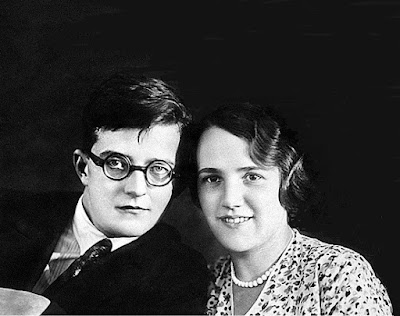I love this photo. You'll likely recognize Shostakovich, and Sergei Prokofiev on the left, and the guy on the right is Aram Khachaturian! (Public domain photo). Dimitry Shostakovich, Pauline Fairclough, 191 pages, Reaktion Books, part of the Critical Lives series, published in 2019.
Pauline Fairclough's biography of Shostakovich is less than 200 pages long, much shorter for example than the Laurel Fay biography, yet it pretty much covers everything the nosy Shostakovich fan would want: A look at his major compositions, his personal relationships and his interactions with the Soviet government.
I suspect that Fairclough, professor of music at the University of Bristol and a Russian music specialist, had to work with space limitations. I looked up two other books in the Critical Lives series published by Reaktion Books Ltd., and they also run to about 200 pages.
So Fairclough had to make choices, and fortunately she makes good ones, resulting in a lively book. There's no long, boring chronicle of his childhood, for example. But she covers the beginnings of his composing career and has interesting discussions of all of his major works, descriptions which fortunately are not terribly technical and seem written for the general reader.
Fairclough also is the author of A Soviet Credo: Shostakovich's Fourth Symphony, about my favorite Shostakovich symphony, which has enjoyed a revival of many recordings in recent years. But to my surprise, her favorite is the Tenth: "The Tenth Symphony was, and is, his greatest symphonic work." There is an interesting analysis and even some nice gossip about how one movement records his crush on a young woman.
In discussing Shostakovich's relations with Soviet officials, Fairclough steers a middle ground, dismissing the idea that he was a dissident and also arguing that depicting him as a Soviet stooge is unfair, although there were quite a few moments he said things he didn't really mean and took shady actions to please the authorities.
And importantly, Fairclough takes her position because it fits the evidence. She convincingly shows that while Shostakovich was not perfect, he often took courageous actions to aid other Soviet composers who were in trouble, such as Mieczysław Weinberg. Many examples of such aid are given, and Fairclough argues that many others likely will never become known. "It is sheer good luck, for example, that the composer Isaak Schwarz discovered that Shostakovich had been secretly paying for his Conservatoire education."
(If you are as ignorant as I apparently am, follow the link to the Wikipedia bio of Schwarz, which has nuggets such as this: "Schwartz's father was professor of archeology at the Leningrad State University: he was arrested in 1936 and executed two years later as part of the Great Purge." Of course, as we are dealing with the Cyrillic alphabet, Fairclough and Wikipedia use different spellings. Remember Woody Allen's old joke that the Russian Revolution picked up steam when the peasants suddenly realized the Tsar and the Czar were the same person?)
Fairclough's attention to information that would keep the reader interested extends to chronicling Shostakovich's love life. She has carefully tracked down photos of nearly all of his wives and girlfriends, (revealing that without exception they were rather good looking) and includes delicious details of Shostakovich's romantic triumphs and mistakes, including this memorable account of his ill-fated courtship of his second wife, Margarita Kainova, a Komsomol official:
" ... called to Shostakovich's apartment to meet Margarita, [Shostakovich pal Lev] Lebedinsky reported that, on her departure, Shostakovich confessed he had just proposed to her. 'Why on earth did you do that?' he enquired. 'Well, that's what has happened and I can't get out of it now' was Shostakovich's reply. Pressed on whether he was in love with her, Shostakovich mumbled 'No'."
The marriage lasted five years; his first and third marriages worked out much better.
Nina Varzar, the composer's first wife
I would like to have read something about Shostakovich's relationship with Sergei Prokofiev, but Fairclough apparently could not cover everything.
It seems to me that Fairclough's pithy account would please many readers who know Shostakovich's music pretty well. And it will also serve as a good account for people who are beginning an interest in the composer.
Update: Professor Fairclough clarifies her opinions on the fourth versus the tenth symphonies: "Incidentally, my favourite Shostakovich symphony is indeed No. 4. It's just that the Tenth is something special in the skill of its construction and I think it is his 'best' but that definitely doesn't make it my own favourite."








